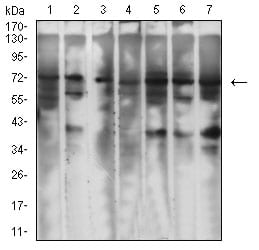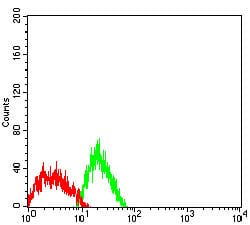


| WB | 1/500 - 1/2000 | Human,Mouse,Rat |
| IF | 咨询技术 | Human,Mouse,Rat |
| IHC | 咨询技术 | Human,Mouse,Rat |
| ICC | 技术咨询 | Human,Mouse,Rat |
| FCM | 1/200 - 1/400 | Human,Mouse,Rat |
| Elisa | 1/10000 | Human,Mouse,Rat |
| Aliases | SGB; DGSX; MXR7; SDYS; SGBS; OCI-5; SGBS1; GTR2-2 |
| Entrez GeneID | 2719 |
| clone | 4D5B1 |
| WB Predicted band size | 65.5kDa |
| Host/Isotype | Mouse IgG1 |
| Antibody Type | Primary antibody |
| Storage | Store at 4°C short term. Aliquot and store at -20°C long term. Avoid freeze/thaw cycles. |
| Species Reactivity | Human, Rat |
| Immunogen | Purified recombinant fragment of human GPC3 (AA: 359-554) expressed in E. Coli. |
| Formulation | Purified antibody in PBS with 0.05% sodium azide |
+ +
以下是3篇关于GPC3抗体的代表性文献摘要概括:
1. **文献名称**:Targeting Glypican-3 in hepatocellular carcinoma using human CAR-T cells
**作者**:Gao H, et al.
**摘要**:研究开发了靶向GPC3的嵌合抗原受体T细胞(CAR-T),在小鼠肝癌模型中显著抑制肿瘤生长并延长生存期,验证了GPC3作为肝癌免疫治疗靶点的潜力。
2. **文献名称**:Immuno-PET imaging of Glypican-3 in hepatocellular carcinoma
**作者**:Zhou Y, et al.
**摘要**:利用放射性标记的GPC3单克隆抗体(YP7)进行免疫PET成像,成功实现肝癌小鼠模型的高灵敏度肿瘤检测,为临床无创诊断提供新策略。
3. **文献名称**:GPC3-specific antibody-drug conjugate exerts antitumor activity against hepatocellular carcinoma
**作者**:Ishiguro T, et al.
**摘要**:构建靶向GPC3的抗体-药物偶联物(ADC),通过特异性结合并释放细胞毒素,在体外和体内实验中均显示显著抗肿瘤活性,推进了ADC在肝癌治疗中的应用研究。
Glypican-3 (GPC3), a member of the glypican family of heparan sulfate proteoglycans, is a cell surface protein anchored to the plasma membrane via glycosylphosphatidylinositol (GPI). It plays critical roles in embryonic development, cell proliferation, and apoptosis regulation by modulating Wnt, Hedgehog, and fibroblast growth factor (FGF) signaling pathways. While GPC3 expression is largely absent in healthy adult tissues, it is overexpressed in several malignancies, notably hepatocellular carcinoma (HCC), hepatoblastoma, and certain germ cell tumors. This tumor-specific expression makes GPC3 a promising biomarker and therapeutic target.
GPC3-targeted antibodies have emerged as valuable tools in cancer diagnostics and therapy. In diagnostics, anti-GPC3 antibodies are used in immunohistochemistry (IHC) to detect HCC and distinguish it from benign liver lesions. Therapeutically, monoclonal antibodies (mAbs) like codrituzumab and antibody-drug conjugates (ADCs) have been developed to exploit GPC3’s tumor-selective presence. These antibodies inhibit tumor growth by blocking oncogenic signaling, inducing antibody-dependent cellular cytotoxicity (ADCC), or delivering cytotoxic payloads directly to cancer cells. Additionally, bispecific antibodies and GPC3-directed CAR-T cell therapies are under investigation in preclinical and clinical trials. Despite promising results, challenges remain, including optimizing antibody specificity, overcoming tumor heterogeneity, and managing treatment resistance. Ongoing research aims to refine GPC3 antibody engineering and combination therapies to enhance clinical outcomes.
×